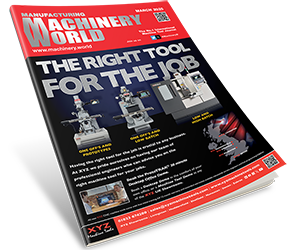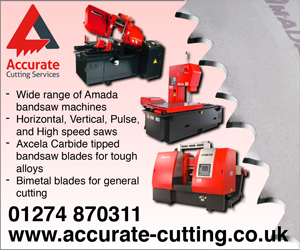All businesses will be glad to draw a line under 2020 and move into 2021, but for Industrial Tooling Corporation (ITC), 2021 will be a landmark year as the UK cutting tool manufacturer celebrates 30 years of business. Here, we take a look back at 30 years of ITC and how this prestigious UK manufacturer has grown over the last three decades – a brand that will be celebrating its anniversary with several 2021 special offers for manufacturers to look out for.
The history of ITC dates back to the late 1980s where the three founders of ITC, Peter Graves, Roy Talbot and Bob Unsworth all worked together at Insley Industrial, the UK agents for the US-based Metal Removal Company, one of the first suppliers of carbide tooling in the UK and the world. Following several late 80’s mergers and acquisitions, the Metal Removal brand that was the preferred choice of several prominent airspace and aero-engine manufacturers was looking for a new UK distributor and the three entrepreneurs spotted their opportunity.
Taking up the story of the early days, Managing Director Peter Graves says: “Bob, Roy and myself spoke with Metal Removal and we became the new UK agents, all leaving our jobs simultaneously to set up ITC. We had a business plan, spoke with accountants and got a bank loan to start the company with backing from Metal Removal, which included a bonded warehouse in Northamptonshire. In the early days, we provided the orders to Metal Removal and they dispatched products from the bonded warehouse, so we only paid for the products we sold.”
“The reason we ended up renting a small office in Tamworth is that Bob lived in Bolton, and covered the North, Roy was from the Midlands and I lived near Watford, and covered the South. It was geographically central and it was close to Rolls-Royce in Derby. It all started in January 91 and there were the three of us, plus two other team members answering the phones. In the early days, our previous employer was trying to disrupt our business and it was a challenging period, but Metal Removal supported us throughout, and after a difficult start, the business started to grow. We bought some stock that crammed our small office before we moved to a larger unit.”
Mr Graves continues: “After two to three years, the business grew and Therese and Lisa joined (they are still here today), we recruited our first technical salesmen, and gradually set upon our growth trajectory. We then added another brand, Vallorbe Swiss HSS end mills, and around 1995 we heard that Hanita was also looking for a UK agent. We got in touch with them and they invited us to Israel. We were taken back by the energy and R&D investment in the company. By the late 1990s, we had these independent brands on board, but Metal Removal was then bought by Kennametal and within another year or two, Hanita was also acquired by Kennametal. Naturally, the relationship evolved from dealing with smaller independent companies to a multinational group, but it was probably a stroke of luck for us that the same group bought both companies.”
A change in the market
“These companies were both supplying solid carbide cutting tools and at the time solid carbide was still building its reputation, as in the early days before its quantum leap forward, it was often thought of as a brittle material – easy to chip or break. The changes to solid carbide over 50 years have been unbelievable. Back when I started selling solid carbide Metal Removal products, it was very expensive and there was no discount. At the time, there were very few companies actively selling solid carbide. So, for companies acknowledging the benefits, it was a relatively captive market. The Metal Removal range always remained a standard product offering of two, three and four flute end mills and drills whereas Hanita pushed the boundaries of product development and performance. With the Vallorbe range primarily HSS, this eventually died off. At this point during the late ’90s, we also bought our first machine.”
Making the Transition to Manufacturing
“After being in business for eight or nine years, we were spending a lot of money on modifications and re-grinds, sending tools to an external grinding company. For a relatively small business, this was a significant expense for us. We ‘chewed the fat’ on whether we should buy a grinding machine and subsequently visited MACH. We ended up on the Walter stand, but at that point, we hadn’t made any concrete decisions. A while later, we were in the office discussing the Walter machines and quite spookily the Walter rep was knocking the door following up the MACH leads. It felt like fate, and for Keith Villiers, the Walter sales rep, the timing was perfect. We eventually bought a Helitronic MiniPower, which was our first machine, along with two Deckel S11 manual machines and an S5 for necking. These were soon followed by a Schneeberger Gemini CNC. We had a small lock-up, the size of a triple garage, with three skilled men running the machines. All of these machines were bought for modifications and re-grinds with a lot of work being radiusing, reducing diameters and step drills. Even at that early point, Metal Removal supported us by adding the radius to a lot of the tools to help us win business. Nowadays, we do all of the modifications and radii on tools in-house.”
“Coming up to 2000, we were busy running the business and selling tools, we employed Paul Marriott as our first production manager and he’s still with us more than 20 years later, albeit in a different role. It was at this time we realised we were running out of space and we then moved to our existing site, which used to be a pet food storage facility. We needed more office space, more storage space and the capacity to add more machine tools. Having a larger facility allowed us to run a centralised cooling system for all the machines.”
The birth of ITC Tools
“Manufacturing our tools probably started in the 90s with our subcontract supplier manufacturing products for us as well as undertaking the re-grinding and modification of existing tools. However, it was when we moved to our current facility that we started to introduce our own product lines. We are currently on issue 15 of our product catalogue and this annual catalogue has grown year on year. We realised we needed our product catalogue and the need to publish this was expedited by Metal Removal deciding to stop publishing their product catalogue. We started publishing a catalogue full of Metal Removal products and we started adding our product lines into the catalogue. Over the years, the catalogue has grown and nearly all of the products are our own with Metal Removal products playing an ever decreasing role,” continues Mr Graves.
The evolution of a leading UK manufacturer
“Since we started, we have changed from being an importer and distributor to being one of the UK’s largest manufacturers of cutting tools. We now have a huge range of tools for all applications. You only have to look at the sign-making industry and the huge variety of tools we make there. We are the largest manufacturer of cutting tools to the sign-making industry by a considerable margin and we are forever developing new tools. To do this we have invested in a routing machine to do research and development of tools for this industry.”
“As we have evolved, we have continually outgrown our facility. We managed to buy an adjacent facility about six or seven years ago, so we could move our stores and add more machines. This gave us a couple more years before we had to decide on a location. For more than 10 years, we had been waiting for the right opportunity to buy the unit next door. We eventually obtained the premises next door and by adding the two facilities, we have now more than doubled our floor area. We now have more than 25 CNC grinding machines for producing cutting tools, but we also have three Helicheck inspection machines and various other production machines for blanking. We have even invested in new machines to manufacture cutting tools from 0.1mm up to 40mm diameter and beyond. The investment in our ‘micro’ set up has cost us more than £1 million but it is paying dividends as the micro grinding machine is always busy and predominantly manufacturing tools below 1mm diameter.”
Extending the portfolio
Over the last 20 years, ITC has continually evolved its product lines with the sign-making tools and the micro-cutting tools being perfect examples. Boasting one of the most diverse and high-quality product offerings in the industry is something that ITC has worked tirelessly to achieve – something that has seen the addition of WIDIA and BIG KAISER to the ITC portfolio.
Discussing this, Mr Graves says: “Kennametal also bought the WIDIA brand, and WIDIA is one of the world’s first manufacturers and longest established brands in the carbide cutting tool industry. Following the acquisition, Kennametal recognised the strength of the WIDIA brand and resurrected it and added the Hanita portfolio to WIDIA – and this is where our connection with WIDIA started almost 15 years ago. As the Hanita agent, we became the WIDIA agent by default, or essentially the WIDIA/Hanita agent in the UK.”
“We had always been recognised as a solid carbide cutting tool specialist and the opportunity to supply indexable tools was something we had long considered, and that opportunity arrived via WIDIA over six years ago. The skill and mindset of selling indexable products compared to solid carbide is somewhat different and we recognised that we needed additional staff. WIDIA were very keen for us to sell the products in the UK, and we now have five sales and applications engineers dedicated to indexable product lines.”
Soon after commencing with indexable tooling sales for WIDIA, the company started to work with BIG KAISER. Recalling the conversation with Peter Poulson from BIG KAISER, Mr Graves recalls: “Out of the blue, I got a call from Peter at BIG KAISER, and whilst I didn’t know him, I certainly knew the name BIG KAISER, as most engineers do. Peter wanted to come to the UK and discuss the opportunity for ITC to be the new UK distributor for BIG KAISER. I was a little sceptical whether BIG KAISER sales would take off; despite the products having exemplary quality and innovation, they had the reputation of being a bit on the pricey side. But I have been proven wrong! Customers are prepared to pay for the innovation and quality, and like the WIDIA indexable range, it has opened new doors for our business. It also makes ITC a complete solution integrator for manufacturing businesses.”
Industry evolution
Following an industrial career that spans almost 40 years, Peter Graves has seen more change than most. Giving his overview of industry evolution in the cutting tool industry, Peter says: “The global purchasing of products has come to the fore in recent times. When we started, we were supplying all end users directly, but with the arrival of integrators, many cutting tool manufacturers like ITC have to work with third-party companies. Somebody once said that in the future there will only be five or six cutting tool companies; what they actually meant was that large companies will continually buy the smaller businesses and integrators will continually play a larger role as OEMs look towards the ‘single source’ model. ITC has also had several approaches down the years from some very large companies. Another thing that has changed down the years is competition from outside the UK, and even more so from outside Europe. Years ago the majority of cutting tool companies supplying UK manufacturers were either from the UK, Europe or the US – now there are increasingly more competitors from the Far East.”
“From our perspective, we have always dealt directly with end-users rather than go via distributors, as we can offer better service and expertise. Inevitably there will always be customers that will adopt the integrated model, and we happily work with that, but we are first and foremost a solution provider. We are loyal to our customers and our suppliers and that is something we will never relinquish. We undertake an annual customer survey and the one thing the results always return is that we have a really good team of people, we give brilliant solutions and products. We may not always be the cheapest, but most people realise they are paying for the engineer to arrive and solve their problems. There will always be companies that will just buy on price, and we realise we always have to be competitive; but our quality, service and reputation are the fundamental cornerstones of what has made ITC a successful business for 30 years,” concludes Mr Graves.
Web: www.itc-ltd.co.uk







